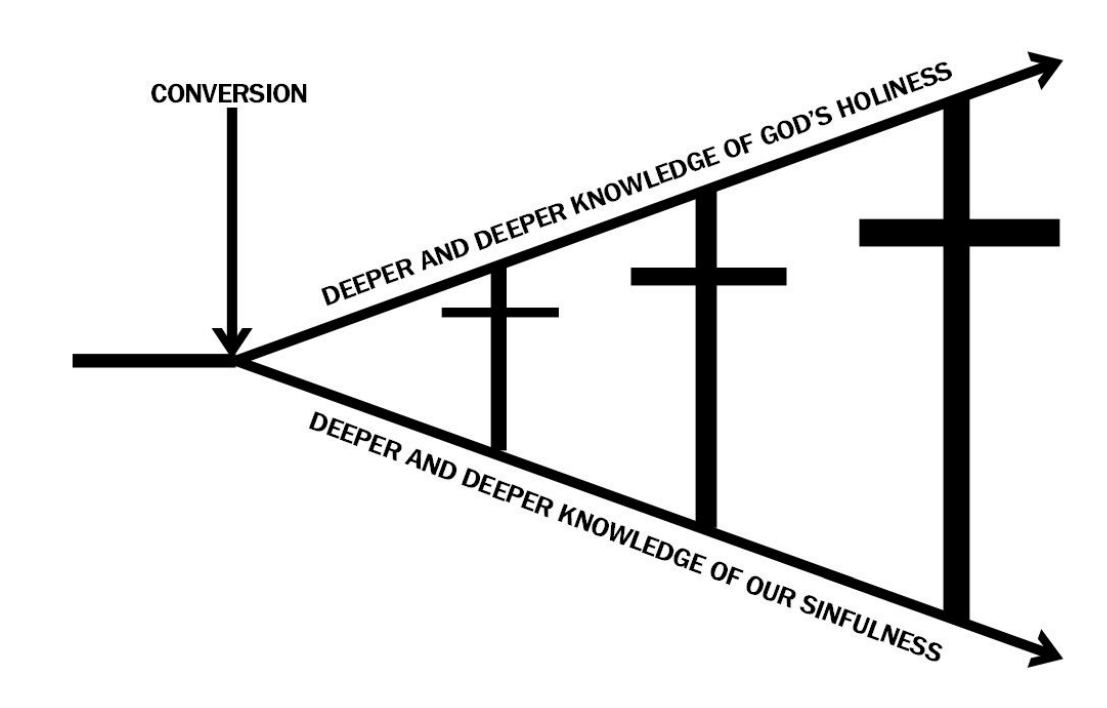The Cross Chart
This past Sunday I shared what Richard Lovelace called the “Cross Chart.” It shows our need for an increasing understanding and reliance on the Gospel of Christ.
Have you ever felt a deep yearning for something more? A sense that life on earth isn't quite enough? This feeling of spiritual homelessness can be the first sign of a growing awareness of God's holiness. We begin to see the limitations of love and justice in the world, and a longing for something greater takes root.
The Holy Spirit helps us understand that what we truly need is God. As we come face-to-face with His holiness, we also become increasingly aware of our own shortcomings. We realize not only the world needs a better concept of love and justice, but so do we. We fall short of our own standards, the expectations of others, and ultimately, God's perfect holiness.
This realization can be overwhelming. If we don't find solace in Jesus' forgiveness and righteousness, the weight of our sin can become a burden. We might resort to pretending – dishonesty, comparisons, excuses, or even focusing on good deeds – all attempts to mask the truth about ourselves.
Performance can be another trap. We might strive to earn God's favor through good works, constantly on a treadmill of trying to measure up.
The good news is that the moment you become a Christian, your sins are forgiven and God's holiness dwells within you. This is a permanent change, a foundation to build upon. As we continue our Christian journey, we see God's holiness more clearly, revealing even greater needs for His transforming love and grace.
Here's the key: Embrace God's forgiveness in Jesus Christ. Rest in the truth that you are already accepted by Him. This frees you from the burdens of pretending and performance. It allows you to grow in your faith and become more like Christ each day.
We Need Luther’s Platform
Bob Goff, reflecting on Lovelace’s Cross Chart, wrote:
Only a fraction of the present body of professing Christians are solidly appropriating the justifying work of Christ in their lives. Many have so light an apprehension of God’s holiness and of the extent and guilt of their sin that consciously they see little need for justification, although below the surface of their lives they are deeply guilt-ridden and insecure. Many others have a theological commitment to [the doctrine of justification], but in their day-to-day existence they rely on their sanctification for justification… drawing their assurance of acceptance with God from their sincerity, their past experience of conversion, their recent religious performance, or the relative infrequency of their conscious, willful disobedience. Few know how to start each day with a thoroughgoing stand upon Luther’s platform: you are accepted, looking outward in faith and claiming the wholly alien righteousness of Christ as the only ground for acceptance, relaxing in that quality of trust which will produce increasing sanctification as faith is active in love and gratitude.
In order for a pure and lasting work of spiritual renewal to take place within the church, multitudes within it must be led to build their lives on this foundation. This means that they must be conducted into the light of a full conscious awareness of God’s holiness, the depth of their sin and the sufficiency of the atoning work of Christ for their acceptance with God, not just at the outset of their Christian lives but in every succeeding day. – Richard Lovelace, Dynamics of Spiritual Life
Do you have “Luther’s Platform”? Is the cross expanding in your life? If not, dig into God’s Word. Rest in Christ. Let HIs “it is finished” reassure you that it really is finished.
With You;
Pastor TIm


